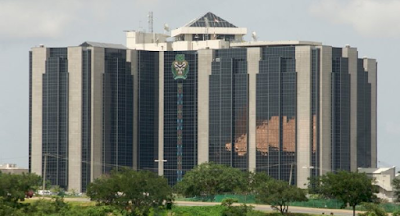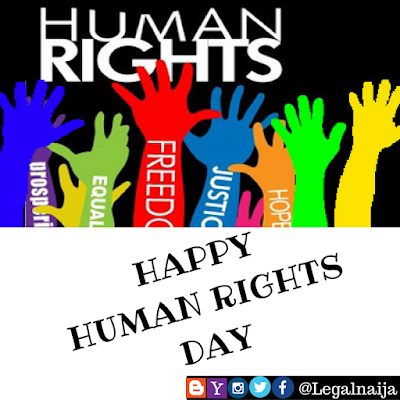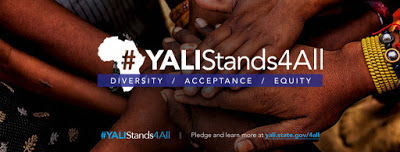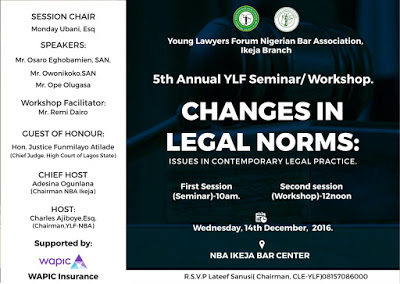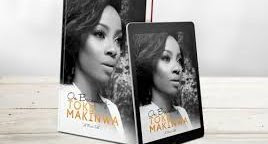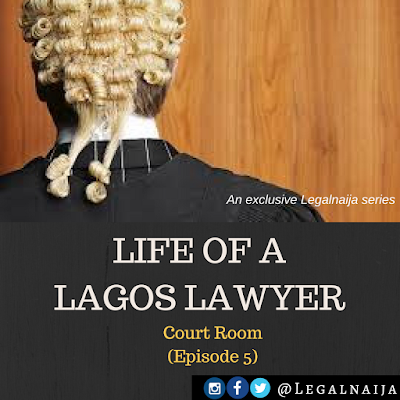*This article, co-
written with Chuks Okoriekwe, was featured in the Legal Insight column of BDLaw
(Legal Section of the influential daily, BusinessDay) of 08 December 2016.
INTRODUCTION
The Central Bank of
Nigeria (CBN) in its effort to starve off the pressure on the Nigerian currency
had drawn the attention of the public to its Currency Substitution and
Dollarization of the Nigerian Currency Circular issued on 17th day April
2015 (the Circular). The Circular essentially leveraged existing legislative
provisions to reiterate the bar against denomination and pricing of local
(visible and invisible) transactions in any foreign currency.
The Circular has spurred
series of questions on the minds of Nigerian who reside in highbrow areas of
Lagos and Abuja where rents, school fees and payment for other social amenities
are made in foreign currency, especially United States Dollars (USD). These
residents in the wake of the reminder now question the validity of contracts
entered with several landowners and service providers (together “payees”) on
settlement of their local obligations in USD; the residents insist that such
contracts are invalid. Prospective residents and/or clients argue –and rightly
so, it appears- that the contracts are contrary to the Circular and insists on
Naira payment.
In the light of this, can
Nigerian residents continue to make payment for local transactions in USD? If
payors are reluctant, can payees insist on payment in USD? The key components
of the regulatory framework are the Foreign Exchange (Monitoring &
Miscellaneous Provisions) Act (Forex Act), Central Bank of Nigeria Act (CBN
Act), the Circular, Revised Guidelines for the Operation of the Nigerian
Inter-Bank Foreign Exchange Market (the Guidelines), and case laws.
CBN’S POSITION ON
DOLLARIZATION OF THE NIGERIAN ECONOMY
In the Circular, the CBN frowned
at the trend of currency substitution and dollarization. It emphasized that
Naira remains the only legal tender in Nigeria. The Circular reminded banks and
other operators of sections 15 and 20, CBN Act which state
that the unit of currency in Nigeria shall be the Naira.
The CBN further reiterated
that it is illegal and an offence to price or denominate the cost of any
product or service (visible or invisible) in any other foreign currency. It
warned that no business offer or acceptance (with the exception of businesses
in the oil and gas industry, maritime, aviation, operators in the free trade
zone and selected government agencies) should be consummated in Nigeria in any
currency other than the Naira. The Circular clearly stated that its provisions supersedes
the provisions of CBN’s Memorandum 16 of the Foreign Exchange Manual
and Paragraph (XI) Section 4.2.1, of the Monetary, Credit, Foreign
Trade and Exchange Policy Guidelines for Fiscal Years 2014/2015. These
moves were geared towards preventing full dollarization of the Nigerian economy
as witnessed in Zimbabwe and Liberia. The impact of a full dollarized economy
is that the country losses it national pride; the foreign currency will be
favored more than the local currency; the Central Bank of such country losses
grip of the monetary policies and high impact decisions on the economy are
taken in the country whose currency is being used.
INCONSISTENCY OF
LEGISLATIONS – CBN ACT AND FOREX ACT
The Circular is contrary
to, and may appear to be of no effect in the face of section 22 Forex Act which
provides that “notwithstanding anything to the contrary
contained in any enactment or law and except as provided in subsection (2) of
this section, no person shall, in Nigeria, make or accept cash payment, whether
denominated in foreign currency or not, for the purchase or acquisition (a)
landed properties (b) securities, including stocks, shares, debenture and all
forms of negotiable instruments; and (c) motor cars, including other vehicles
of any description whatsoever”. The section further provides that “payments
for the aforementioned items shall, as from the commencement of the Act, be
made by means of bank transfers or cheques drawn on banks in Nigeria only”.
(Emphasis supplied). The implication of the use of the word “notwithstanding”
is that the provision supersedes any conflicting provision on the same subject
matter. The Supreme Court in Nigeria Deposit Insurance Corporation v.
Okem [2004] 10 NWLR (Pt.880), 107 at 182, held that: “when
the term ‘notwithstanding’ is used in a section of a statute, it is meant to
exclude an impinging or impeding effect of any other provision of the statute
or section so that the said section may fulfil itself.”
A careful reading of the
above provision suggests that in the case of land – lease or assignment (and
other categories listed above), the lessee/assignee can, based on the Forex Act
provision, make USD payment through bank transfer or cheques. The
subsection only prohibits cash payments; once cash is not involved, then the
parties, arguably, have not violated the provisions of the Circular? It could
therefore be possible for the Parties (subject to risk appetite of the
counterparty), to agree a Naira amount in a lease agreement with the
understanding that USD equivalent be wired to the lessor’s domiciliary account.
It appears the use of foreign currency for local transaction is further
supported by the tax laws that require payment and accounting for taxes in the
currency of the relevant transaction, for example VAT and withholding tax.
It however gets more
interesting! Although the argument above is plausible and takes advantage of
the lacuna in Forex Act; the CBN Act (and the Circular) appears to have plugged
the exposure. The Circular mandated, with penal consequences, that Deposit
Money Banks (DMBs) should desist from collecting foreign currencies for payment
of domestic transactions on behalf of their customers and the use of customers’
domiciliary accounts for making payments for transactions originated and consummated
in Nigeria. Thus, pursuant to the CBN Act, payees are seemingly constrained in
insisting on USD rents and other payments. In the face of what appears to be an
inconsistency in the two federal legislation the question arises: Does the
Forex Act supersede the CBN Act (the basis for the Circular) and vice versa?
SUPERSEDING LEGISLATION
There seems to be an
apparent inconsistency/contradiction in the two principal legislations (CBN and
Forex Acts) regulating forex in Nigeria. Whilst the CBN Act has stringent and
prohibitory provisions, the Forex Act has a lacuna that could be utilized if
legal analysis were to determine its supremacy in the event of conflict between
the two laws. The question therefore is which of these two legislations will
supersede? Two rules may be resorted to in resolving the conflict.
The first is that a
subsequent legislation prevails over an earlier one. Secondly, specific
legislation may prevail over a general legislation. For this purpose,
the Forex Act is a specific legislation for forex transactions, whilst the CBN
Act which primarily regulates banking, would be a general legislation with
respect to forex transactions. It is arguable however that the CBN Act is also
a specific legislation since it gives the CBN power to regulate the Nigerian
currency. This may mean that the two legislation neutralize themselves on this
point.
Furthermore, in
considering the general legislation vs. specific legislation rule, the
supremacy provision of the Forex Act becomes irrelevant in the instant case
because the CBN Act was later in time to the Forex Act. The irrelevance of the
Forex Act is predicated on the fact that the legislator is presumed not to
legislate in vain, and is presumed to have carefully considered existing legal
provisions before enacting the later law, such that the later Act evidences
legislative intention to amend the law through the express inconsistent
provision with earlier Act. Axiomatically, where a special or private Act is
absolutely inconsistent and repugnant with a subsequent general Act, the courts
have a duty to declare the prior special or private Act or any of their
provisions repealed by the subsequent general Act: Cowpact Disc
Technologies Ltd & Ors. v. Musical Copyright Society of Nigeria Gtd. (MCSN)
(2010) LPELR-CA/L/787/2008. Consequently, local forex
transactions (unless exempted by CBN) would be caught by the prohibition
pursuant to the CBN Act and subsidiary instruments, such as the Circular.
The CBN further reiterated
its position in the Guidelines. Whilst introducing the OTC FX Futures financial
product, the CBN indirectly reinstated in Guideline 2.2.1 that Naira is
the only acceptable currency for transactions in Nigeria; this is a resounding
way for the CBN to maintain its position. Although Futures transactions are
hedged against the USD, the Guideline insists that at settlement of trade, the
difference between the contract and spot price is paid in Naira. It is
therefore apparent that payees may not continue to demand for USD denominated
fees or rent, as the case may be, in the wake of the CBN Circular. Having
determined payees’ position going forward, the issue of the validity of extant
contracts entered into before the Circular, remains.
Whenever there is a change
in law on a particular issue, such change affects existing (payment)
obligations of contracting parties in the absence of any stabilisation or
freezing clause in the agreement (stabilization or freezing clauses ensure that
where economic situation or condition changes, the parties’ rights are not
directly affected rather, terms are renegotiated to ensure economic
equilibrium. It seems this clause, albeit common in oil and gas deals, is yet
to come before Nigerian courts for determination). The Nigerian courts have
however held that frustration of contract occurs where it is established to the
satisfaction of the court that due to a subsequent change in circumstances
which was clearly not in the contemplation of the parties, the contract is said
to become impossible to perform: Diamond Bank Ltd. v. Ugochukwu [2008]
1 NWLR (Pt. 1067) 1 at 28. The Implication therefore is that the
restatement by the Circular is tantamount to a change in circumstance thus the
parties are obligated to renegotiate their contract in the local currency.
In the American
cases of Anderson v. Equitable Assurance Society of United States (1926)
134 LT 557 and British Bank for Foreign Trade Ltd v. Russian
Commercial and Industrial Bank (1921) 38 TLR 65 it was held that
performance of a payment obligation must be effected in whatever is considered
legal tender at the time of performance (unless there is a stabilization
clause). Flowing from this principle therefore, it appears that the CBN
position in the Circular affects both existing and new transactions.
From the foregoing,
although payees negotiated and entered into existing agreements with
counterparties before the change, they may not be able to collect rent/other
fees in USD in the face of the Circular. It will be illegal and an offence to
denominate the rent payable either for the renewal or new lease in USD.
LEEWAY FOR INVESTORS
Vietnam had a similar
situation as Nigeria years back. In the wake of Vietnamese Ordinance on
Foreign Exchange in 2005 (Ordinance No. 28/2005/PL-UBTVQH11) amended in
2013 (Ordinance No. 06/2013/UBTVQH13), the Vietnamese Courts were approached
severally to determine whether parties can take advantage of USD denominated
contracts. In one of such cases, the Vietnamese Supreme Court (Resolution
No. 04/2003/NQ-HDTP), held that if an economic contract contains agreements
on prices and payment in foreign currencies but parties are not allowed to make
payment in foreign currencies, the contracting parties are allowed to make
payment in Vietnamese Dong (VND) whilst using the foreign currencies as price-determining
currency in order to stabilize the contracted value.
The Vietnamese position
appears to be similar to the situation in Nigeria. It therefore seems that
payees can take advantage of the structure adopted in that country in
determining whether it can reference the parallel market in its agreement. The
query is whether the parallel market is recognized as a legal market in
Nigeria? The parallel market, though not provided for under any existing local
legislation in Nigeria, appears to be recognized; no law in existence appears
to proscribe reference to the parallel market for USD access. Thus, although
the market is not provided for, it is not illegal and at least the regulatory
authorities have exhibited a “permissive” attitude towards its existence and
operation.
The “permissive” attitude
of the authorities towards the parallel market was displayed in CBN’s comments
following the introduction of the OTC FX Futures and other policies on forex.
The CBN mentioned that one of the reasons for its policies and introduction of
the financial product is to foster a convergence of the interbank and parallel
market USD rates. Furthermore, Section 9 Forex Act seems to also recognize this
market when it states that “the rate at which each transaction in the Market
shall be executed shall be the rate mutually agreed between the applicant
purchaser and the Authorised Dealer or Authorised Buyer concerned.”
In our view, since the
parallel market adopts the price determination mechanism created by the Forex
Act, it is not in breach of any extant legislation, but rather, appears to be
recognized under the law. In any event, following the Vietnamese position above
where their Supreme Court held that benchmarking contract amount in dollars is
not illegal (albeit only a persuasive authority), it appears that payees can
also reference the parallel market in their agreements.
CONCLUSION
We
take the view that once the parties deal independently and at arm’s length, a
reference to parallel market by parties in consummating their contract may be
recognized. This position is based on the fact that parties commonly benchmark
their contracts against the Nigeria Inter Bank Offer Rate (NIBOR) or the London
Inter Bank Offer Rate (LIBOR). In the same way, parties can reference the
parallel market in their contracts in order to hedge against currency
fluctuations.
Associate
at LeLaw Barristers & Solicitors
Tochukwu
is admitted to the Nigerian Bar, and holds an LLM in Corporate, Finance and
Securities laws from the New York University School of Law. Tochukwu has a
strong interest for capital markets, securities transaction and finance, with
an ardour for dispute resolution, both in the international and local sphere.
Tochukwu is goal-driven, resourceful and a natural team player. Whilst
Tochukwu’s career interest is in international business law and transactions,
he is also committed to worthy charitable courses, and has offered his
assistance on a pro bono basis in certain cases.
Ed’s Note – This article was originally published here.
